What Was Pax Deorum And How Important Was It?
A. Sutherland - AncientPages.com - Pax Deorum ("peace of the gods") signified the central goal of the Roman state religion.
The Pax Deorum provided divine protection to the Roman Empire, which needed this kind of security as much as material protection from the army's side. Thus politics and religion cooperated.
Tellus Relief, Ara Pacis. Photo by kind permission of Dr. Janice Siegel
Also, all the citizens of Rome had to participate in the process. People had to provide the gods with worship and cult to obtain a mutually beneficial and satisfactory peace between Rome and its deities.
The gods, on the other hand, safeguarded Rome's public welfare.
In religious practice, the harmony or agreement between the divine and humans was the Pax Deorum, and it was only given in return for correct spiritual practice. Religious practice was critical because it secured the Pax Deorum and prevented divine retribution, which could strike the city of Rome anytime.
The Pax Deorum was a delicate affair. It could be easily broken by several errors in the performance of ritual, for instance, or religious faults and negligence, which resulted in the so-called "divine disharmony" (ira deorum) and the anger of the gods.
"The rupture in the Pax Deorum may be seen as rupturing the fundamental order of the Roman state, casting the society back into a transitional or liminal state, "a time and place of withdrawal from normal modes of social action…." (Orlin E. Foreign Cults in Rome: Creating a Roman Empire).
The Roman system of public divination was crucial for the society and "functioned to reassure the Romans that each action they undertook had the blessing of the gods; in this way, divination was an essential part of the Romans' belief that they were the most religious of all people and therefore had a special connection to the divine…", Orlin continues in his book.
The Pax Deorum was understood as the "Goodwill of the Gods" and was expressed in a perfect and harmonious relationship between Man (Rome and its people) and Divinity (all the gods worshiped by them).
Such good relation between the Romans (chosen people of the gods) and the heavens was expressed in several ways, such as festival arrangements, sacrifices, signs, wonders, and diverse statues, which were reminders of the Pax Deorum.
The Romans truly believed that the Pax Deorum would make it possible for them to come closer to gods and master the unknown, divine forces around them, and in consequence, they would be able to live successfully.
It's worth noting that the Pax Deorum was a concept that variations were practiced throughout history in other ages and cultures.
Written by – A. Sutherland AncientPages.com Staff Writer
Updated on April 25, 2023
Copyright © AncientPages.com All rights reserved. This material may not be published, broadcast, rewritten or redistributed in whole or part without the express written permission of AncientPages.com
Expand for referencesReferences:
Alston R. Aspects of Roman History, AD 14-117, Del 14–117
Orlin E., Foreign Cults in Rome: Creating a Roman Empire
More From Ancient Pages
-
 Beautiful Gold ‘Lynx’ Earrings Discovered In The Ruins Of The Ancient Lost City Of Ani Go On Display In 2023
Archaeology | Dec 29, 2022
Beautiful Gold ‘Lynx’ Earrings Discovered In The Ruins Of The Ancient Lost City Of Ani Go On Display In 2023
Archaeology | Dec 29, 2022 -
 4,500-Year-Old Skeletons Found In SW China
Archaeology | Apr 19, 2016
4,500-Year-Old Skeletons Found In SW China
Archaeology | Apr 19, 2016 -
 Day Of The Dead: From Aztec Goddess Worship To Modern Mexican Celebration
Ancient Traditions And Customs | Oct 30, 2019
Day Of The Dead: From Aztec Goddess Worship To Modern Mexican Celebration
Ancient Traditions And Customs | Oct 30, 2019 -
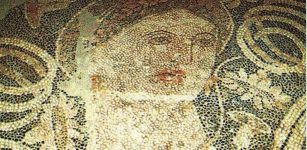 Wax Tablets Reveal Ancient Secrets of The Illyrians
Artifacts | Sep 5, 2015
Wax Tablets Reveal Ancient Secrets of The Illyrians
Artifacts | Sep 5, 2015 -
 Amazing Archaeological Discovery In A Secret Underground Structure In Transylvania Could Rewrite Ancient History
Featured Stories | Feb 13, 2024
Amazing Archaeological Discovery In A Secret Underground Structure In Transylvania Could Rewrite Ancient History
Featured Stories | Feb 13, 2024 -
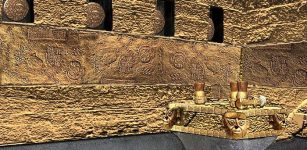 Coricancha – Stunning Golden Garden And Lost Treasures Of The Inca
Featured Stories | Aug 20, 2021
Coricancha – Stunning Golden Garden And Lost Treasures Of The Inca
Featured Stories | Aug 20, 2021 -
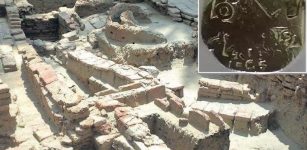 Keeladi Ancient Site Of Tamil Nadu – A Punch-Marked Silver Coin Unearthed
Archaeology | Jul 31, 2021
Keeladi Ancient Site Of Tamil Nadu – A Punch-Marked Silver Coin Unearthed
Archaeology | Jul 31, 2021 -
 Face-To-Face Encounter With Young Scottish Soldier Who Lived And Died Over 300 Years Ago
Archaeology | Dec 23, 2017
Face-To-Face Encounter With Young Scottish Soldier Who Lived And Died Over 300 Years Ago
Archaeology | Dec 23, 2017 -
 Underwater Nabataean Temple With Marble Altars Discovered In Pozzuoli
Archaeology | Apr 12, 2023
Underwater Nabataean Temple With Marble Altars Discovered In Pozzuoli
Archaeology | Apr 12, 2023 -
 Pyramid Texts Of Ancient Egypt That Charted Journey Of Pharaohs Into Afterlife
Ancient Mysteries | Feb 26, 2020
Pyramid Texts Of Ancient Egypt That Charted Journey Of Pharaohs Into Afterlife
Ancient Mysteries | Feb 26, 2020 -
 Clovis People Invented ‘Fluting’ Ancient Stone Weaponry
Archaeology | Apr 5, 2017
Clovis People Invented ‘Fluting’ Ancient Stone Weaponry
Archaeology | Apr 5, 2017 -
 St. Swithin’s Day And The 40 Days’ Weather Prophecy
Featured Stories | Jul 15, 2023
St. Swithin’s Day And The 40 Days’ Weather Prophecy
Featured Stories | Jul 15, 2023 -
 Surprising Discovery Of A Perfectly Ancient Road Shows Romans Moved Deeper Into Wales Than Previously Thought
Archaeology | Jul 2, 2022
Surprising Discovery Of A Perfectly Ancient Road Shows Romans Moved Deeper Into Wales Than Previously Thought
Archaeology | Jul 2, 2022 -
 On This Day In History: Storming Of The Paris Fortress – Prison Bastille – On July 14, 1789
News | Jul 14, 2016
On This Day In History: Storming Of The Paris Fortress – Prison Bastille – On July 14, 1789
News | Jul 14, 2016 -
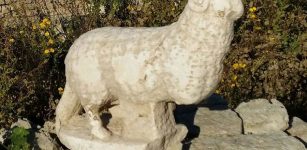 Impressive Marble Statue Of A Ram, An Ancient Christian Symbol For Jesus Discovered
Ancient Symbols | Dec 28, 2015
Impressive Marble Statue Of A Ram, An Ancient Christian Symbol For Jesus Discovered
Ancient Symbols | Dec 28, 2015 -
 Smallest Ancient Thracian Brick Tomb – Discovered In Bulgaria
Archaeology | Oct 6, 2018
Smallest Ancient Thracian Brick Tomb – Discovered In Bulgaria
Archaeology | Oct 6, 2018 -
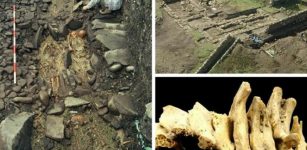 Isle Of May Was A Pictish Healing Center – Monks Used Herbs To Treat Sick And Dying People
Archaeology | Feb 16, 2018
Isle Of May Was A Pictish Healing Center – Monks Used Herbs To Treat Sick And Dying People
Archaeology | Feb 16, 2018 -
 Denisovan Family Tree: New Branches Revealed In Ancient DNA
Archaeology | Apr 12, 2019
Denisovan Family Tree: New Branches Revealed In Ancient DNA
Archaeology | Apr 12, 2019 -
 Astronomically Aligned Pyramidal Buildings Of America’s Oldest City Reveal How Its Builders Apprehended Space And Time
Archaeology | Apr 15, 2021
Astronomically Aligned Pyramidal Buildings Of America’s Oldest City Reveal How Its Builders Apprehended Space And Time
Archaeology | Apr 15, 2021 -
 A 500-Year-Old Funerary Bundle And Pottery Probably Belonging To Ychsma Culture – Unearthed Near Lima, Peru
Archaeology | May 22, 2023
A 500-Year-Old Funerary Bundle And Pottery Probably Belonging To Ychsma Culture – Unearthed Near Lima, Peru
Archaeology | May 22, 2023


